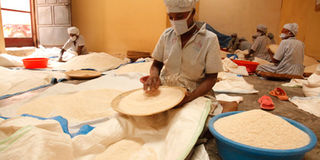Partnerships helping Sheema farmers add value to produce

Numa has boosted farmers by buying produce from them. PHOTO BY Fred muzaale
Realising they were not getting enough profit from selling their produce as individuals, Sheema farmers formed an association and started supplying Numa Feeds Ltd. This has made all the difference, writes Fred Muzaale.
Five years ago, Obedi Byashemererwa was a broke man. A resident of Kashekuro village, Kitagata Sub-county, Sheema District, Byashemererwa lived in a mud and wattle house with his family.
Together with fellow farmers under their organisation, Kitagata Farmers Group, Byashemererwa grew millet, cassava and maize on a medium scale, thus, he occasionally sold the surplus to middlemen, who used to offer them poor prices.
But all the farmers in the association got poor yields given that they did not have good agronomic practices since they had not received any training from extension workers.
Besides the low prices they were being paid for their produce, they were also being cheated as the buyers were using fake weighing scales that under-weighed their produce.
As a result, their incomes were low, making them live miserable lives.
Getting lucky
However, after realising they were not gaining much from their sweat, in 2013, Byashemererwa, the coordinator, and other group members, (381 in number), decided to start working with Numa Feeds Ltd. And since then, the move has amazingly changed their fortunes. Like Byashemererwa testifies, their yields have improved in terms of quality and quantity, hence their incomes.
Numa Feeds is a small scale agribusiness company located in Kabwohe Town, Sheema District that processes food including millet flour, posho, soyabean flour, rice flour and cassava flour plus poultry and animal feed.
The farmers’ relationship with Numa meant they were to supply the company with raw materials such as millet, maize, rice and cassava.
“We signed a contract with Numa under which we agreed on how much produce we would supply them and at what cost. This enabled us to have a say on the prices of our produce,” Byashemererwa says.
However, at the time the farmers started working, Robert Matsiko, the Numa managing director, says they were facing production challenges as a result of receiving wet grains from farmers.
“We had to sun-dry the produce, though, in some cases it did not totally dry leading to molds and wastage,” Matsiko says, adding, “since we had to spend a lot of time drying and roasting the grains manually, the production process took long.”
Challenges
Limited land. Matsiko notes that the biggest challenge farmers are facing is limited land, which impedes their full capacity to produce.
Bleach of contract. He also says some of their farmers do not sell to them, even after training them and giving them inputs leading to losses.
Enough capital. Matsiko says Numa lacks enough capital to buy all their farmers’ produce especially during the harvesting season causing some farmers to sell to other buyers.
Climate. Climate change is also impacting negatively on farmers’ productivity, especially on soyabean growing, which needs a long rainy season. Matsiko says this necessitates them to get quick maturing or drought resistant soyabean varieties.
Adding value
In 2016, through a partnership with Agribusiness Trust (aBi), Matsiko says, Numa overcame its production challenges. He explains that aBi provided them with grants of Shs145 million to buy a grain drier and Shs20 million for a soyabean roasting and steaming machine plus Shs40 million for a batching machine.
“aBi’s intervention increased our production from two tonnes a day to four since the machines dried the grains faster and thoroughly,” Matsiko notes.
Because of the efficient production system, Numa must maintain a steady and sustainable supply of quality raw materials.
Mastiko says they guarantee this through working with farmers groups. Currently, he says, Numa is working with 211 farmers’ groups with about 19,000 individual members, all spread in the four districts of Sheema, Mbarara, Ibanda and Bushenyi. “With support from organisations such as aBi Trust, Numa is able to provide quality seeds, inputs and trainings to our farmers in good agronomic practices, post-harvest handling and collective marketing,” he says.
Mastiko adds that since collecting centres have been put in place, farmers have the responsibility to maintain high quality produce with the help of moisture metre equipment through quality assurance committees.
It is, therefore, not surprising that Byashemererwa and fellow farmers say working with Numa has improved their incomes. For instance he now earns about Shs25 million each harvesting season from the previous Shs5 million. “I have built a permanent house and paid for my childrens’ education,” Byashemererwa says.




